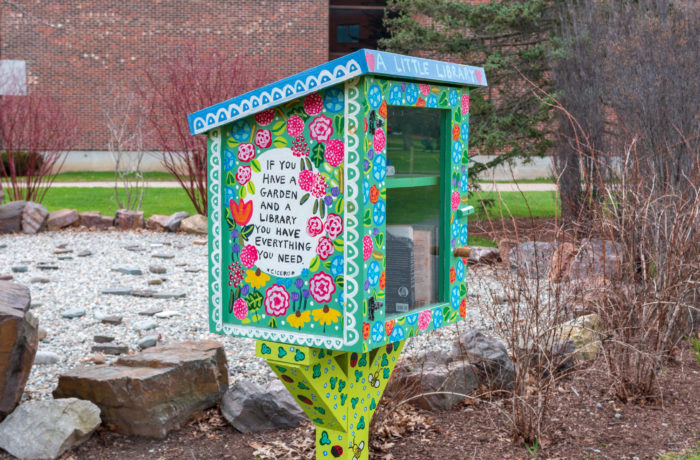
By Hannah Hession Staff Writer
Before starting her freshman year, Rachel Lyons ‘21 had never paid much attention to her sugar intake. At home, junk food was rarely kept in the house and she seldom ate dessert; but when she arrived at school on an unlimited meal plan, she suddenly found herself surrounded by dozens of sugar-rich foods and drinks. Cakes, cupcakes, and cookies of all kinds were constantly on display at the dining hall dessert table, and an endless stream of ice cream from the creemee machine was available for breakfast, lunch, or dinner.
“The first semester of freshman year I really struggled with my diet” Lyons said. “Being on the unlimited meal plan, it was so easy to swipe in and get a creemee after class. With the added stress and anxiety of starting college, there were times I had ice cream three times a day.”
“I know for a fact I could never quit sugar,” Lyons said. “I’ve tried a couple times before, but have never been very successful.”
Like a lot of college students, Lyons struggles with sugar addiction, an emotional or psychological dependency on sugary foods or drinks caused by certain neurotransmitters in the brain. And she is not alone; in a small survey of 25 people conducted among students in the dining hall, on aver- age, students reported they ate dessert around four times a week and had seven sugary beverages in the same amount of time. While, this was not a scientific study, 88 percent of those surveyed thought they consumed too much sugar.
“Sugar is extremely addictive, and at the level of the brain, it releases two neurotransmitters that reinforce that addiction,” said Melissa VanderKaay Tomasulo, Associate Professor of Psychology and Director of the Neuroscience Program. “They are the same neurotransmitters that are released with drugs of abuse or compulsive behaviors like gambling.”
Dopamine, one of those neurotransmitters, is released when you do something that makes you feel good. It reinforces that behavior and makes you more likely to repeat it in the future. Opioids, the other neurotransmitter, are the body’s natural pain killers. Together, these two chemicals create an addictive cocktail that makes it almost impossible to resist a craving.
The American Heart Association recommends a daily maximum of 36 grams of sugar for men and 25 grams for women – though they say most Americans are consuming more than double that amount. According to Tomasulo, this kind of excessive sugar consumption can cause weight gain and hormone imbalance, affect mood and sleep, and increase anxiety. “In general, the diet that you have can affect your mental well being,” Tomasulo said.
What’s a student to do?
“[To break a sugar addiction,] I wouldn’t recommend going cold turkey. Just like with other addictions, you should start with a reasonable goal and make small changes.” Tomasulo said. Sugar is a necessary part of any diet – your body needs natural sugar from foods like berries or sweet potatoes because your brain runs on glucose. But with the increased availability of processed and packaged foods, there can often be too much of a good thing.
How to “Quit” Sugar:
• Make small changes: Swap processed sugars for natural sugars by substituting your after-lunch cookie with a banana. Or try some seltzer with a splash of fruit juice instead of a soda. Small changes over time can make a big difference.
Practice stress reduction techniques: Stress is a major
cause of sugar cravings and can often lead to emotional eating and poor food choices. Meditation, yoga, and exercise are all great ways to reduce stress. Getting enough sleep and drinking water can also help decrease stress and thus cravings.
• Know what you’re eating: Read the nutrition labels on food before you buy. Pay close attention to foods with “hidden” sugar like granola bars, salad dressing, cereal, and even spaghetti sauce. If you eat at Alliot, check out the Green Mountain Dining Room menu on smcvtdining.sodexomyway.com.
• Find support: Quitting a bad habit is much easier when you have someone to encourage and support you. Especially around the holidays or vacation time, it’s important to have a support system in place to hold you account- able to your goal. Find a friend who will motivate you or join you in your decision.


